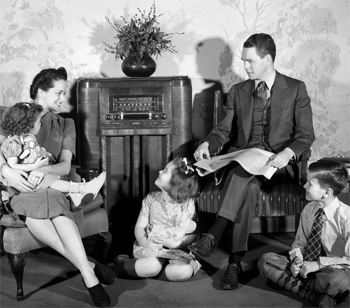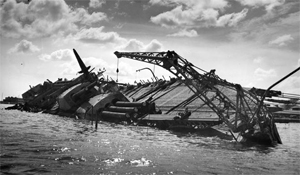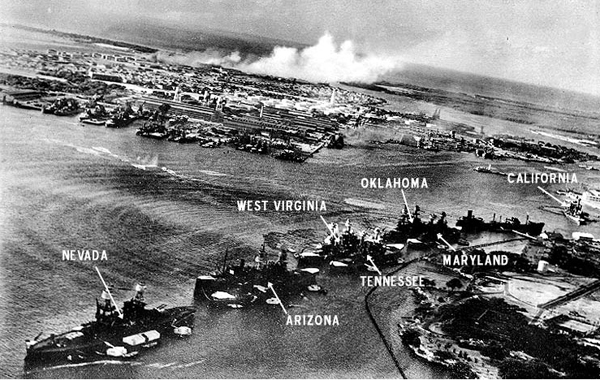Thehenryettan.com historian Earl Goldsmith remembers the radio broadcast about the disaster.
Even though he was 11 at the time and a sixth grader at Washington grade school, he still recalls those events:
It was Sunday afternoon when the news arrived in Henryetta, and many people there first learned of Pearl Harbor when they came out of the movies, which was a very popular thing to do on Sunday afternoons, after attending church in the morning.
 I don't recall just what we were doing at our house that afternoon. My father was probably reading the bible, which is something he did every day, my sisters were probably studying or doing homework, and my mother was as busy as mothers always are taking care the house, getting meals cooked, etc. I was probably just goofing off - there is little chance that I was studying.
I don't recall just what we were doing at our house that afternoon. My father was probably reading the bible, which is something he did every day, my sisters were probably studying or doing homework, and my mother was as busy as mothers always are taking care the house, getting meals cooked, etc. I was probably just goofing off - there is little chance that I was studying. We didn't have the radio on all afternoon until my father turned it on about five or six in the evening to hear the news. The surprise attack at Pearl Harbor was all they were talking about.
I had no idea where Pearl Harbor was, but even as a kid, I knew there were bad feelings between the U. S. and Japan because we had stopped shipping oil to Japan to get them to stop their warring action in the areas to the north and west, and probably south, of them.
In the news, I learned that the battleship Arizona had been sunk and over a thousand were lost in it. And being from Oklahoma, I was really upset that the battleship Oklahoma had capsized and they were trying to figure out a way to get the men out of it. (I could go on writing about how they got many of the Oklahoma survivors out of the bottom of the ship, which was above the water, but that could wait till another time.)

We kids though anything labeled as being made in Japan was pure junk, so we didn't buy it in the Five and Dime stores. Even at that young age, we knew that if a Japanese man was seriously embarrassed, he killed himself by committing "hari-kari by pulling a dagger across his stomach. So the next day, as I and my male friends were walking to school, we all agreed that they would be committing "hari-kari" very soon.
The U. S. had started a draft, primarily because German actions in 1939. I had some older cousins who were drafted, and one was the drum major of the Henryetta marching band that year. But getting drafted didn't hurt most of them financially very much because the great depression was still going on in 1939. It took the war to really end the depression.
The next morning at school, they gathered kids from several different class into bigger groups in a few rooms to hear President Roosevelt's famous "Day of infamy" speech, which he ended by asking congress to declare that a state of war existed between the U. S. and Japan.
 Even though Great Britain was in danger, he didn't ask that congress declare war on Germany. But on Friday of that week, the Hitler declared war on us. The word was that he had an agreement with Japan, that if they were attacked by anyone, Germany would declare war on the country that attacked them. But we didn't attack Japan, and I think Hitler was just wanting to have a war with the U. S., which was already shipping war materials, including even ships, to Britain, and having many of our ships lost by being attacked by submarines.
Even though Great Britain was in danger, he didn't ask that congress declare war on Germany. But on Friday of that week, the Hitler declared war on us. The word was that he had an agreement with Japan, that if they were attacked by anyone, Germany would declare war on the country that attacked them. But we didn't attack Japan, and I think Hitler was just wanting to have a war with the U. S., which was already shipping war materials, including even ships, to Britain, and having many of our ships lost by being attacked by submarines.Early in the war, Japan was winning just about everywhere, and we were not able to stop them while shipping so much to England,.
We were still building up our navy to fight Japan in a sea war, and were building military bases all over the country. Except for shipping things to Britain, in Roosevelt's famous "lend-lease" program, it was late 1942 - maybe early 1943 - before we were involved in the war with Germany (and Italy) against the famous German General Erwin Rommel, in North Africa.
With Japan winning just about everywhere, I can remember a time very early in the war, when while walking to school, I was actually afraid that Japan would win the war and would even take over Henryetta. Was I scared? You bet.

